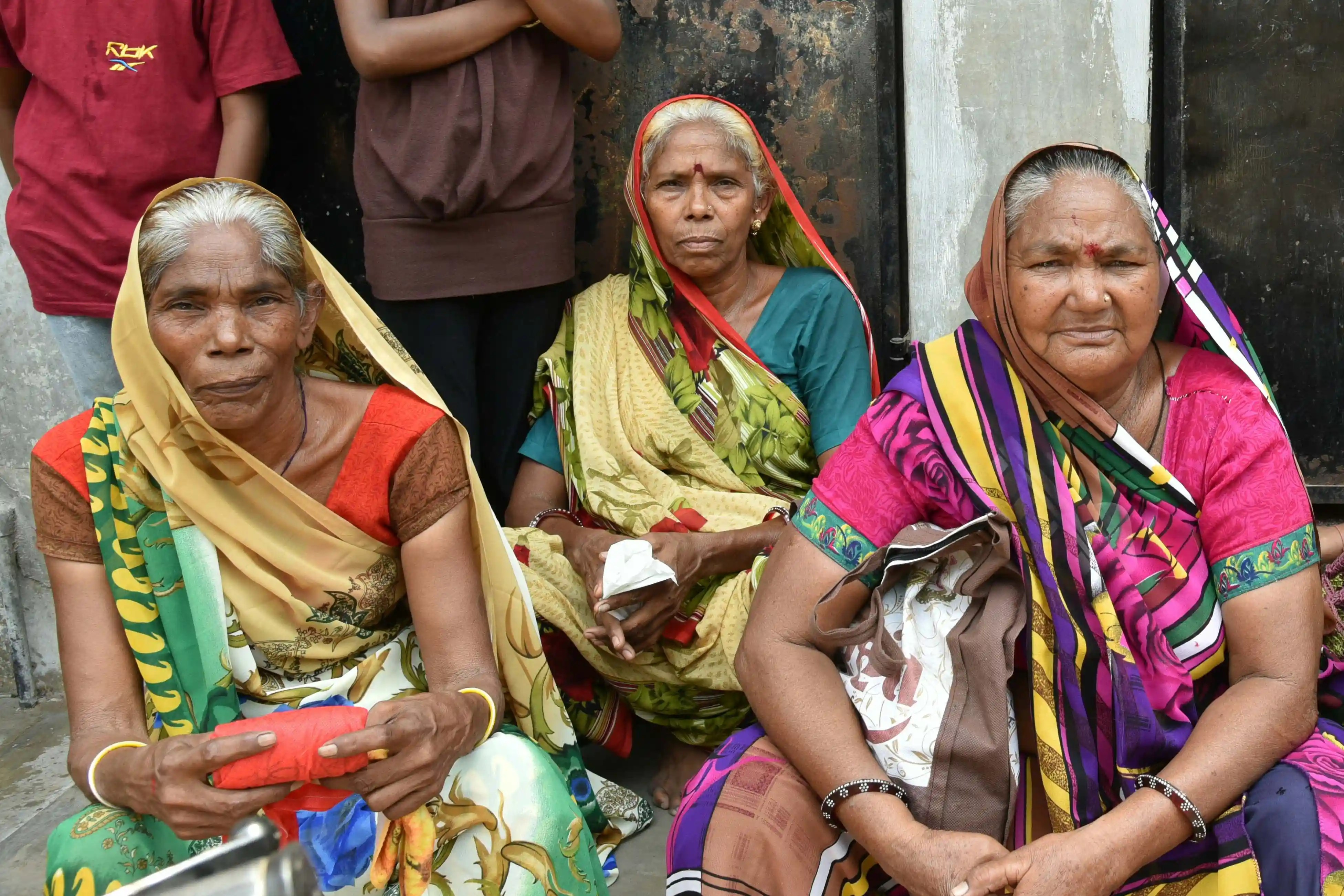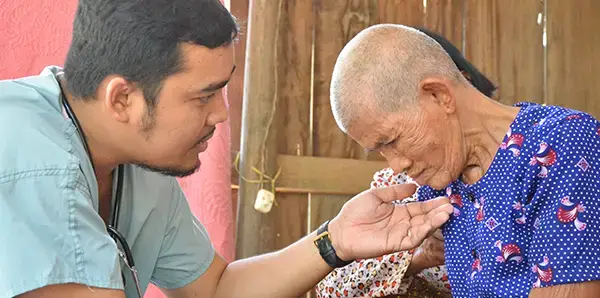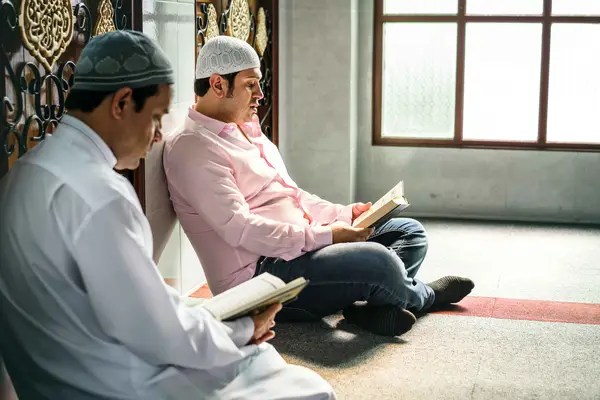When Muslims read the Bible for the first time and what surprises them most

What does reading the Bible with Muslims who have never read it look like? It comes with a lot of questions, and some pretty astute revelations.
“The world still has problems. So who’s our Savior?”
“What is it with sacrifice? Abraham, Moses, and here in this passage [Isaiah 53], every other phrase talks about sacrifice and someone dying for someone else!”
“I looked at that man and thought he was bad. But after last week [when I learned that Jesus said, ‘I came not to call the righteous, but sinners.’], I realized I am worse.”
“If we’re trying to be satisfied in anything else other than the living water He talks about, it will never work.”
“It seems like the two thieves on either side of Jesus represent all of humanity. Everyone has the same problem, but there is one big difference. One recognized it but the other didn’t. And there is God in between them.”
Each one of these was spoken by a Muslim in our unreached people group as they encountered Bible stories from Genesis to Jesus. Each of these came from someone who had never read the Bible before meeting us. Each of them is from a context in which societally it has been frowned upon or forbidden to read the Bible. And yet, weekly, nearly 10 Muslims who do not yet know Jesus gather to read the story of redemption.
Why? Why do they show up and why does that shape our ministry?
Millions of people live here, and we have no locally-led churches. If we accept “less than 2% believers” as a rough benchmark for whether a people group is considered unreached, this people group is closer to 0.0002%. We have never met another professing Christian where we live.
Where do you start in that kind of place?
While we are engaged in lots of activities to aim at establishing churches, we’ve decided as a team that our key focus is to invite people to participate in small group Bible discussions going through the story of redemption. We organize these studies in such a way that if people come to faith, the patterns set would allow the group to transition toward the seed form of a church.
Why do we love these studies?
We believe these studies are strategic in helping us aim at the establishment of local churches eventually led by local people.
But on a personal level, we also love the opportunity to sit with people and read the Word with them. Here are several reasons:
1. The studies are wild.
When we read these stories with people, we get to watch them experience reading the Bible for the first time. Things that seemed like plain, ordinary story elements are often shocking to them.
“You are telling me,” one woman said, “that God himself was washing the dirty feet of the disciples!” It was so unthinkable to her, and yet she keeps coming back week after week. “I wonder,” she reflected, “if I had had this book’s understanding of God my whole life, how would my life have been different?” Oh, how much we want her to keep asking herself that question!
In one group study, a man who was there for the first time listened while the story was read aloud. Before anyone could start the discussion, he asked, “Is this from the Taurat (OT) or Inuit (NT)?” After receiving confirmation that it was from the New Testament he said, “I read online that this is forbidden for Muslims to read.” After (pleasantly) exchanging a few words, he walked out. That left an interesting flavor to the evening! But the wild part is this: Everyone else, despite hearing what he said, acted as if it never happened and just got back to the discussion. Everyone just heard that they should not be allowed to read this book. Collectively, they actively chose to ignore that rebuke (which they have heard their whole lives from authority figures) and read it anyway!
One time, after reading the story of Jesus raising Lazarus, we asked everyone who they could share the story with. One woman said, “I’m going to take this story down to the mosque and tell everyone that it’s OK to cry when their family member dies!” Reflecting on the fact that many people operate with a fatalism here that doesn’t publicly allow for emotions like grief and sadness when someone dies, she said, “I’m going to tell them, ‘Jesus cried, it’s OK, you can too!’” Who knew that the shortest verse in the Bible, John 11:35, “Jesus wept,” could actually affect someone so deeply?
We long for each one of these stories to end in repentance, faith, and new life with Jesus. But in the meantime, we get the wild privilege of walking alongside them, seeing the Bible through their eyes, leading them to encounter truth, and letting it challenge what they have been told all their lives.
2. The studies are Word-centered.
Early on, we set the parameter that we’re here to read the text in front of us and not compare it with the Qur’an or other sources. If someone makes a claim, we ask, “Where did you see that in this text?” Incredibly, that DNA has taken hold. If there is someone new who tries to make a claim that isn’t obviously from the text, one or more of the group members will often say, “That’s interesting, but where did you see that here?” They debate back and forth on what the text means. So many times, I have sat there and thought, “Should I intervene? Should I say something?” More often than not, someone else from the group says something like, “But read the words before and after that. You can’t understand it without that!”
We confess that God uses His Word. We confess that the Spirit works through the Word. With that conviction, we want simply to lead them to encounter God’s Word, to see the beauty of who God is and what He has done.
So why do people keep coming?
They haven’t professed faith yet, so why do they keep showing up? The answers are as varied as the people who come, but from our experience, here are some of our observations.
1. Coherent stories make sense of the world they live in.
Their background has versions of many of these stories. But they are generally known in disconnected pieces, and as a result, most of them have little sense of the historical or narrative flow of the stories. The Bible, on the other hand, is full of complete stories that show what God is like and what people are like, and the stories build on each other. This allows a sense of the world and our place in it to develop over time, which is something that they have been missing.
Building on that, the stories in the Bible reflect the world they live in. Part of the Bible’s apologetic power is that it cuts through the noise of competing ideas that simply don’t jive with what we experience, such as the claim that people are basically good and are only affected by their environment. While many here find that idea appealing, it doesn’t reflect their experience of the world or their own hearts. Jesus saying, “I didn’t come to call the righteous, but sinners,” reflects a different perspective on our real problem.
2. The Bible speaks to the issues going on in their hearts.
After reading the story of the Samaritan woman (John 4), I was talking with one of the men. He asked some clarifying questions about the story, so I pointed out to him that Jesus turned the conversation from living water to the woman’s seeking of satisfaction in relationships with men.
He stopped and said, “So the question is, where would Jesus have taken the conversation with me?”
Yes, indeed, that is the question. But he went on:
“You know what? I’ve been buying chakra crystals online compulsively for the last few months. I don’t even know why, but I think somehow it will help me. I think Jesus would ask me about that.”
What?! In a deeply Islamic country, it almost seems unimaginable that chakra crystals are what people are turning to. But this man was hardly alone. Many people are turning to new age thinking, because the legalistic right or wrong exclusive focus they were raised with is unsatisfying.
But when confronted with these stories from the Bible, they recognize that the Bible is different. It brings them face-to-face with what is going on in inside. And we have the privilege of being there to walk with them through that journey.
3. The studies create the context where questions are OK.
Most of these people were raised in environments where even asking a question about faith issues was considered unacceptable. But that doesn’t mean they didn’t have questions. They just squashed them.
When we read the Word, before we get into the meat of the discussion, we usually ask the question, “What surprised you?” Not only do we learn so much from their answers about how the text hits them in their culture, but it also creates the context for them to ask questions in a non-threatening way.
As we go on in the study, their questions are usually answered by the text itself (Scripture interpreting Scripture), but the opportunity to ask and question and explore resonates deeply with them.
Our goal is to see healthy reproducing local churches in our unreached people group. Right now, we are still in the early stages of aiming at that and the shape our work takes is inviting as many people as possible to get into God’s word and explore with us.
It’s a bit wild at times, but we’re convinced there’s nothing more exciting or more rewarding.
Would you like to Engage Muslims Through a Discovery Bible Study? This is one of our top needs! Click the link to get started.
*JR is an MTW missionary working with Muslims in a sensitive country.







